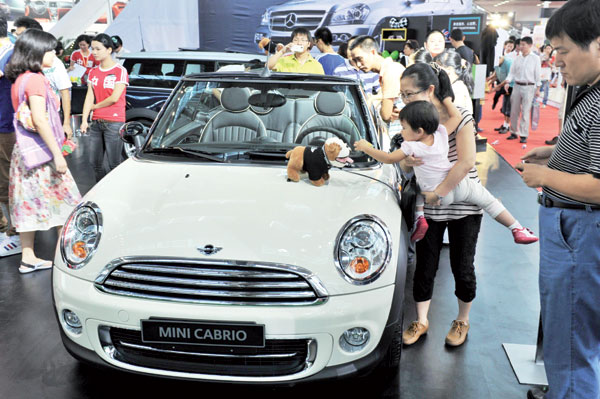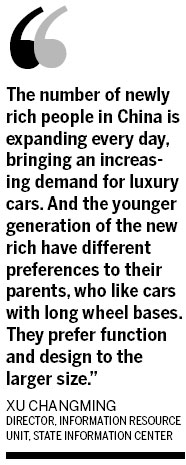Luxury-car makers go for compacts
Updated: 2012-04-05 13:29
By Li Fangfang (China Daily)
|
|||||||||||
 |
|
A Mini Cabrio surrounded by visitors to a luxury vehicle show in Shenzhen, Guangdong province. The major car-buying power in China has changed from people born in the 1960s to post-70s and post-80s. The latter two prefer cars with a more modern appearance. Yu Ge / For China Daily |
 |
|
A model in a luxury vehicle during an auto fair in Guangzhou, capital city of Guangdong province. Seeing new opportunities, nearly all foreign luxury-car producers have brought their entry-level models - compact cars with competitive prices of less than 300,000 yuan ($47,619) and small engines of between 1.5 and 2.5 liters - to the Chinese market during the past three years. Wu Luming / For China Daily |
Younger generation prefers smaller vehicles and tends to stay loyal when upgrading, say experts.
After gaining a foothold in China's large vehicle market, foreign luxury car brands are now looking for more opportunities in the small-car sector by launching entry-level compact models.
Statistics show that sales of luxury vehicles maintained a strong momentum when China's overall automobile market slowed down sharply in 2011, with total sales of up to 950,000 units. The sector's growth of 38 percent over the previous year is almost eight times the rate of the passenger vehicle sector's 5.19 percent.
Significantly, sales of entry-level models, which only became available three years ago, increased about 18 percent, while sales of medium-sized luxury vehicles surged 30 percent. The growth of long-established premium luxury cars grew just 9 percent. Sales of large, luxury sports-utility vehicles rose 4 percent.
The cars with an engine capacity of, or less than, 2.5 liters led the luxury vehicle sector with year-on-year growth of 59 percent, while sales of those with 3 or more liter engines rose 12 percent, indicating a trend toward engine-downsizing in the booming industry.
"The number of newly rich people in China is expanding every day, bringing an increasing demand for luxury cars. And the younger generation of the new rich has different preferences to their parents, who like cars with long wheel bases," said Xu Changming, director with the information resource unit of the State Information Center. "They prefer function and design to the larger size."
Chi Yifeng, general manager of Yayuncun Automobile Trade Market in Beijing, agreed with Xu.
 |
"The major car-buying power has changed from people born in the 1960s to post-70s and post-80s, who prefer cars with a more modern appearance. It is also happening in the luxury-car sector," said Chi.
"And as more of the young second generations of rich families get to choose a luxury brand for their first car, we are confident of the huge potential for smaller luxury vehicles over forthcoming years."
Seeing the new opportunity, nearly all foreign luxury-car producers have brought their entry-level models - compact cars with competitive prices of less than 300,000 yuan ($47,619) and small engines of between 1.5 and 2.5 liters - to the Chinese market in the past three years.
The sector, which accounted for just 2 percent of the market in 2008, surged to 7.8 percent in the first half of last year and is still expanding.
German premium car brand BMW was the early bird. It brought its 1 series hatchbacks to Chinese customers in 2008. Its rival, Mercedes-Benz, launched its B class at the beginning of 2009 and Audi's A3 model hit the market in August 2010.
The fast development of the entry-level luxury sector gave Mercedes-Benz the confidence to introduce it's A class to China in 2010, while Audi launched its smallest A1 model and Japanese brand Lexus debuted its compact hybrid CT200h in China last year. Targeted at urban customers aged 25 to 40, the CT200h was Lexus' first model at a price under 300,000 yuan in China.
Klaus Maier, president and chief executive officer of Mercedes-Benz (China) Ltd told China Daily that the launch of its entry model A class not only completed its line-up in China but also helped the company further develop a younger image and enabled more Chinese customers to enjoy the benchmark comfort, safety and driving pleasure of the premium brand.
The German premium brand has benefited from its strategy, with clear evidence that more than 40 percent of its total sales in China consisted of products tailored for the younger generation.
"For luxury automakers, entry models are a strategic product used to ensnare customers because many of the owners of those compact luxury cars will maintain a brand loyalty when they decide to upgrade their vehicles," said Cui Dongshu, deputy secretary-general of the China Passenger Car Association. "Therefore, competition in the entry-level luxury car sector is significant and will be more intense in the near future."
Today's Top News
Rescuers race against time for quake victims
Telecom workers restore links
Coal mine blast kills 18 in Jilin
Intl scholarship puts China on the map
More bird flu patients discharged
Gold loses sheen, but still a safe bet
US 'turns blind eye to human rights'
Telecom workers restore links
Hot Topics
Lunar probe , China growth forecasts, Emission rules get tougher, China seen through 'colored lens', International board,
Editor's Picks

|

|

|

|

|

|





